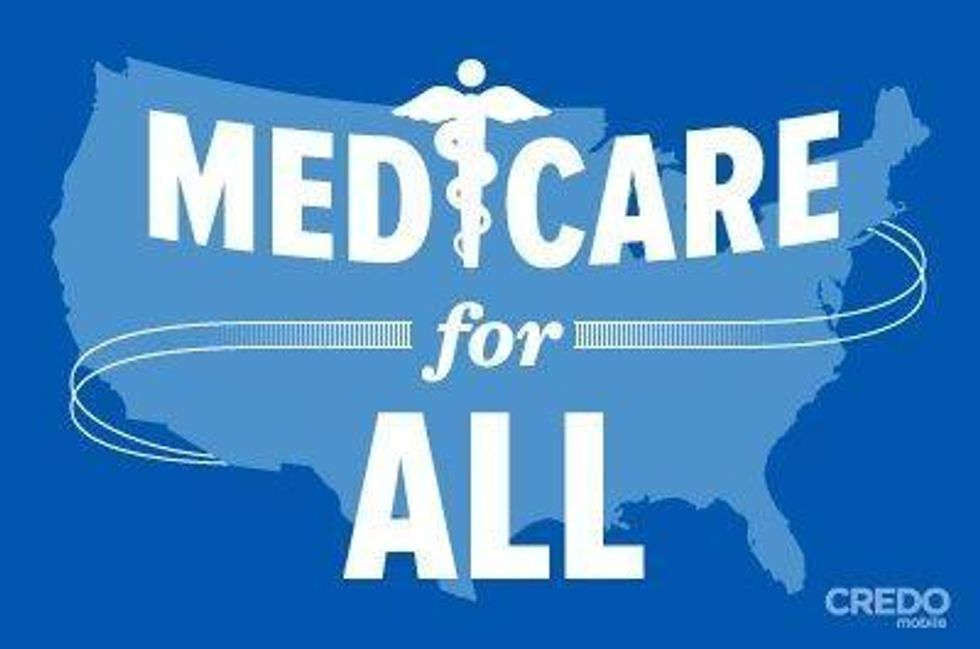In January 2009, at the age of 63 1/2, my friend Carol Bentley was laid off her 10-year job without warning. In a one-two punch, her health insurance ended the next day.
She could not afford COBRA.
Desperate about her medical expenses, she was rescued when federal stimulus money temporarily subsidized COBRA for the unemployed. That covered her until she was eligible for Medicare in July 2010.
Even now, tears fill her eyes as she talks about the terror and humiliation of that time. And, without Medicare, she wouldn't be able to afford necessary care. "I might not even be alive right now," she said.
Picture those tears as you think of the proposed changes in Medicare.
First, some facts. You have undoubtedly heard the claim that Medicare is moribund. As with Mark Twain, reports of its demise have been highly exaggerated.
The Medicare Part A (hospital coverage) Trust Fund will be solvent until 2024. Even then, using current assumptions, it will cover 87 percent of benefits. And Medicare parts B (outpatient) and D (the drug benefit), funded by premiums and taxes, will continue to be solvent.
Medicare operates relatively efficiently, spending 3 percent or less on administration and overhead compared with 12-14 percent for private insurance.
Elderly Medicare beneficiaries are more satisfied with their insurance and have better access to care and less financial burden from medical bills than non-elderly adults with employer-based insurance.
Does this justify pulling the plug on Medicare as we know it? Hardly.
Some proposed changes are particularly counterproductive. The suggestions to raise the eligibility age to 67 and institute means-testing are high on this list.
Raising the eligibility age would cause physical, mental and financial suffering in seniors who would wait two more years for coverage. It would disproportionately hurt the poor, who are less likely to have other insurance and who have lower life expectancies, giving them fewer years to benefit. It would cost-shift medical expenses from the federal government to others while doing nothing to lower costs. In July 2011, the Kaiser Family Foundation estimated that for the $5.7 billion in federal savings, there would be $3.7 billion additional expenses for affected elderly individuals, $4.5 billion for employers, and billions more for other Medicare beneficiaries and those insured through the exchanges, all of whose premiums would rise.
Means-testing would create one more bureaucracy to implement new criteria, one more set of hurdles for the elderly and disabled to hobble over.
The success of Medicare, like other popular programs such as Social Security, lies largely in its broad base of support. Programs targeted to the poor often become poor programs -- and thus miss their mark of improving services to the very people they are supposed to help.
Often lost in this disembodied discussion of billions here, billions there, is the question of health. One of the few health indicators on which the U.S. does relatively well is life expectancy at age 65, unquestionably related to Medicare coverage.
To improve Medicare, let's improve the benefits package, eliminate deductibles, decrease red tape and actually improve well-being while saving money overall.
In the short term, we could eliminate the Medicare Advantage plans (saving $34.1 billion), supply additional appropriations from general tax revenues, allow Medicare to negotiate drug prices, and modify the payroll tax (last adjusted system-wide in 1985) which would sustain the program longer.
Back to Carol's tears and fears. Multiply those by millions - and think of all the tears we could save in 65- and 66-year-olds by maintaining the current eligibility age. Then think of all the younger uninsured people who try to hold on until the magic age of 65. The Affordable Care Act will insure some but leave millions uncovered.
They will benefit from the long-term solution: to improve Medicare and extend it to all, taking advantage of low administrative costs and high potential for savings and establishing a publicly financed, mainly privately delivered health system.
Only then will we have truly sustainable Medicare - and a truly sustainable health care system for all.


